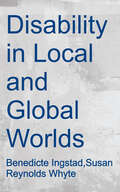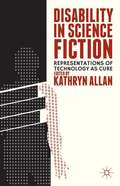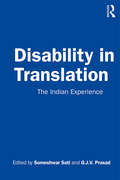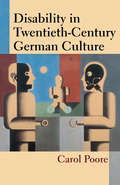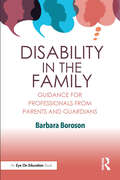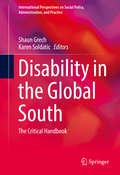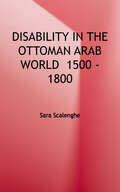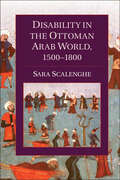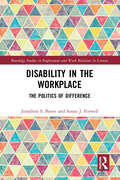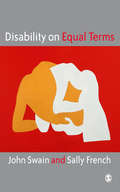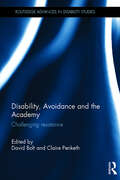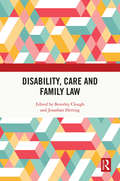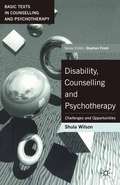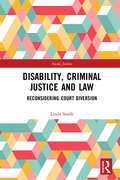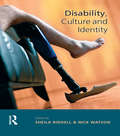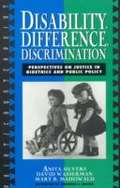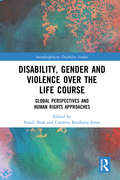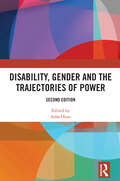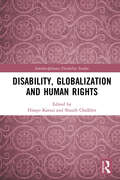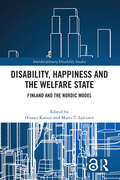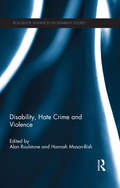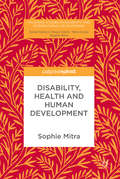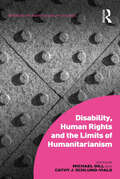- Table View
- List View
Disability in Judaism, Christianity, and Islam
by Darla Schumm Michael StoltzfusThis edited collection of essays critically examines how diverse religions of the world represent, understand, theologize, theorize and respond to disability and/or chronic illness. Contributors employ a wide variety of methodological approaches including ethnography, historical, cultural, or textual analysis, personal narrative, and theological/philosophical investigation.
Disability in Local and Global Worlds
by Susan Reynolds Whyte Benedicte IngstadThe lives of many disabled people in Europe and North America have improved over the past two decades through innovative technologies and the efforts of the disability rights movement. These changes have been spreading to other societies around the globe―albeit unevenly. In this collection of essays, leading scholars explore global changes in disability awareness, technology, and policy from the viewpoint of disabled people and their families in a wide range of local contexts. The authors report on ethnographic research in Brazil, Uganda, Botswana, Somalia, Britain, Israel, China, Egypt, India, and Japan. They address the definition of disability, the new eugenics, human rights in local contexts, domestic and state citizenship of disabled people, and issues of identity and belonging.
Disability in Science Fiction
by Kathryn AllanIn this groundbreaking collection, twelve international scholars - with backgrounds in disability studies, English and world literature, classics, and history - discuss the representation of dis/ability, medical "cures," technology, and the body in science fiction.
Disability in Translation: The Indian Experience
by Someshwar Sati G.J.V. PrasadThis volume explores how disability is seen, written about, read and understood through literature and translation. Foregrounding the asymmetrical world of power relations, it delves into the act of translation to exhibit how disability is constructed and deployed in language and culture. The essays in the volume reflect and theorise on experiences of translating various Indian-language stories (into English) which have disability as their subject. They focus on recovering and empowering marginal voices, as well as on the mechanics of translating idioms of disability. Furthermore, the book goes on to engage the reader to demonstrate how disability, and the space it occupies in our lives, can be reinforced or deconstructed in translation. A major intervention in translation and disability studies, this volume will be of great interest to scholars and researchers of literature, culture, and sociology.
Disability in Twentieth-Century German Culture
by Carol PooreDisability in Twentieth-Century German Culture covers the entire scope of Germany's most tragic and tumultuous century---from the Weimar Republic to the current administration---revealing how central the notion of disability is to modern German cultural history. By examining a wide range of literary and visual depictions of disability, Carol Poore explores the contradictions of a nation renowned for its social services programs yet notorious for its history of compulsory sterilization and eugenic dogma. This comprehensive volume focuses particular attention on the horrors of the Nazi era, when those with disabilities were considered "unworthy of life," but also investigates other previously overlooked topics including the exile community's response to disability, socialism and disability in East Germany, current bioethical debates, and the rise and gains of Germany's disability rights movement. Richly illustrated, wide-ranging, and accessible, Disability in Twentieth-Century German Culture gives all those interested in disability studies, German studies, visual culture, Nazi history, and bioethics the opportunity to explore controversial questions of individuality, normalcy, citizenship, and morality. The book concludes with a memoir of the author's experiences in Germany as a person with a disability.
Disability in the Family: Guidance for Professionals from Parents and Guardians
by Barbara BorosonThis insightful guide shows professionals how to collaborate with parents and guardians of children with disabilities in empathic, respectful, knowledgeable, and supportive ways. Packed with first-hand accounts and advice from parents and guardians, this book shines a light on lived experiences and reveals paths toward meeting families where they are in order to move forward together. Boroson emphasizes that appreciating the real needs of these families is a crucial step beyond mere adherence to a generic set of professional best practices or principles. Whether working in the field of medicine, education, law, mental health, or related services—in any capacity—readers will come away with the holistic knowledge, inclusive language, productive strategies, and differentiated understanding needed to work effectively with the diverse families they serve. Included is a robust array of resources for families, such as books, articles, associations, organizations, and support networks, along with a website for additional, up-to-date resources.
Disability in the Global South
by Shaun Grech Karen SoldaticThis first-of-its kind volume spans the breadth of disability research and practice specifically focusing on the global South. Established and emerging scholars alongside advocates adopt a critical and interdisciplinary stance to probe, challenge and shift common held social understandings of disability in established discourses, epistemologies and practices, including those in prominent areas such as global health, disability studies and international development. Motivated by decolonizing approaches, contributors carefully weave the lived and embodied experiences of disabled people, families and communities through contextual, cultural, spatial, racial, economic, identity and geopolitical complexities and heterogeneities. Dispatches from Ghana, Lebanon, Sri Lanka, Cambodia, Venezuela among many others spotlight the complex uncertainties of modern geopolitics of coloniality; emergent forms of governance including neoliberal globalization, war and conflicts; the interstices of gender, race, ethnicity, space and religion; structural barriers to redistribution and realization of rights; and processes of disability representation. This handbook examines in rigorous depth, established practices and discourses in disability including those on development, rights, policies and practices, opening a space for critical debate on hegemonic and often unquestioned terrains. Highlights of the coverage include: Critical issues in conceptualizing disability across cultures The challenges of disability statistics. Colonialism and disability Disability and poverty: critical renegotiations Livelihoods and disability: the complexities of labouring in the global South. Intersectional terrains, including migration, race, ethnicity, and customary embodiedness Disability and Religion Violence against disabled women in the global South: working locally, acting globally. Disability-inclusive disaster risk reduction The UNCRPD and critical orientations towards disability rights within various contextual settings Redistribution systems including disability inclusive budgeting, social security regimes and social policy measures Global South-North partnerships: intercultural methodologies in disability research. This much awaited handbook provides students, academics, practitioners and policymakers with an authoritative framework for critical thinking and debate about disability, while pushing theoretical and practical frontiers in unprecedented ways.
Disability in the Ottoman Arab World, 1500-1800 (Cambridge Studies in Islamic Civilization Ser.)
by Sara ScalenghePhysical, sensory, and mental impairments can influence an individual's status in society as much as the more familiar categories of gender, class, religion, race, and ethnicity. This was especially true of the early modern Arab Ottoman world, where being judged able or disabled impacted every aspect of a person's life, including performance of religious ritual, marriage, job opportunities, and the ability to buy and sell property. Sara Scalenghe's book is the first on the history of both physical and mental disabilities in the Middle East and North Africa, and the first to examine disability in the non-Western world before the nineteenth century. Unlike previous scholarly works that examine disability as discussed in religious texts such as the Qur'an and the Hadith, this study focuses on representations and classifications of disability and impairment across a wide range of biographical, legal, medical, and divinatory primary sources.
Disability in the Ottoman Arab World, 1500-1800 (Cambridge Studies in Islamic Civilization)
by Sara ScalenghePhysical, sensory, and mental impairments can influence an individual's status in society as much as the more familiar categories of gender, class, religion, race, and ethnicity. This was especially true of the early modern Arab Ottoman world, where being judged able or disabled impacted every aspect of a person's life, including performance of religious ritual, marriage, job opportunities, and the ability to buy and sell property. Sara Scalenghe's book is the first on the history of both physical and mental disabilities in the Middle East and North Africa, and the first to examine disability in the non-Western world before the nineteenth century. Unlike previous scholarly works that examine disability as discussed in religious texts such as the Qur'an and the Hadith, this study focuses on representations and classifications of disability and impairment across a wide range of biographical, legal, medical, and divinatory primary sources.
Disability in the Workplace: The Politics of Difference (Routledge Studies in Employment and Work Relations in Context)
by Jonathon S. Breen Susan J. ForwellThis book introduces the difference model of disability. Framed within an affect-based understanding of the relationships between those living with impairments and others, this new model offers a reconsideration of the construct of disability itself. Disability is flexible, relational, and perceived through an acognitive lens. At a practice level, the difference model offers a framework for creating more positive and successful relationships between people with disabilities (PWDs) and others within the workplace. This includes two new tools, the Co-Worker Acceptance of Disabled Employees (CADE) Scale and the Perceived Barriers to Employing Persons with Disabilities (PBED) Scale. Designed to measure workplace attitudes, and changes to these attitudes, each of these scales provides empirical evidence in support of strategic planning and, ultimately, an increased representation of PWDs. Finally, this book considers the effects of language and technology on workplace attitudes toward disability.
Disability on Equal Terms
by John Swain Sally French'Disability on Equal Terms is not a Turgid and difficult book despite its accent on complex and challenging themes. It is a lively and important read' - The Skill Journal, June 2009 `[A] collection of highly readable and scholarly essays that reflect both the theoretical and practical implications of recent developments in the field. This book is essential reading for everyone interested in disability: highly recommended' - Colin Barnes, Centre for Disability Studies, University of Leeds This authoritative collection of writings examines and challenges traditional notions of disability. Edited and written by leading experts in the field, it offers a multidisciplinary approach to disability studies, incorporating perspectives from a wide range of health and social care services, as well as a distinct and unique emphasis on the views, experiences, work and personal testimonies of disabled people themselves. The book is divided into three sections, each of which is prefaced by an editorial introduction which brings together the key themes and issues under discussion. Each section: " Examines the dominant assumptions about disability and impairment and their historical and cultural contexts " Documents the challenges to such presumptions generated by disabled people themselves " Explores the implications of such challenges for professional policy and practice This ground-breaking book will be essential reading for those studying disability studies, social work, nursing, and allied health and social care at all levels. It will also be a thought-provoking and inspiring read for disabled people and activists, professionals and policy makers. John Swain is based in the School of Health, Community and Education Studies at Northumbria Univeristy. Sally French is based at the Open Univeristy. Previous publications include the co-edited Disabling Barriers, Enabling Environments, Second Edition (SAGE, 2004).
Disability perspective in rehabilitation
by Rajesh Kr Verma Pragya VermaThis book will give the brief history about mental retardation, hearing impairment, visual impairment, autism spectrum disorder, learning disabilities, deaf blind and cerebral palsy and how the developments has been taken place in India and abroad. This book also contains different National and International Acts/Policies benefits for the persons with disabilities globally.
Disability, Avoidance and the Academy: Challenging Resistance (Routledge Advances in Disability Studies)
by David Bolt Claire PenkethDisability is a widespread phenomenon, indeed a potentially universal one as life expectancies rise. Within the academic world, it has relevance for all disciplines yet is often dismissed as a niche market or someone else’s domain. This collection explores how academic avoidance of disability studies and disability theory is indicative of social prejudice and highlights, conversely, how the academy can and does engage with disability studies. This innovative book brings together work in the humanities and the social sciences, and draws on the riches of cultural diversity to challenge institutional and disciplinary avoidance. Divided into three parts, the first looks at how educational institutions and systems implicitly uphold double standards, which can result in negative experiences for staff and students who are disabled. The second part explores how disability studies informs and improves a number of academic disciplines, from social work to performance arts. The final part shows how more diverse cultural engagement offers a way forward for the academy, demonstrating ways in which we can make more explicit the interdisciplinary significance of disability studies – and, by extension, disability theory, activism, experience, and culture. Disability, Avoidance and the Academy: Challenging Resistance will interest students and scholars of disability studies, education studies and cultural studies.
Disability, Care and Family Law
by Jonathan Herring Beverley CloughThis book explores the series of issues that emerge at the intersection of disability, care and family law. Disability studies is an area of increasing academic interest. In addition to a subject in its own right, there has been growing concern to ensure that mainstream subjects diversify and include marginalised voices, including those of disabled people. Family law in modern times is often based on an "able-bodied autonomous norm" but can fit less well with the complexities of living with disability. In response, this book addresses a range of important and highly topical issues: whether care proceedings are used too often in cases where parents have disabilities; how the law should respond to children who care for disabled parents – and the care of older family members with disabilities. It also considers the challenges posed by the UN Convention on the Rights of Persons with Disabilities, particularly around the different institutional and state responsibilities captured in the Convention, and around decision-making for both disabled adults and children. This interdisciplinary collection – with contributors from law, criminology, sociology and social policy as well as from policy and activist backgrounds – will appeal to academic family lawyers and disability scholars as well as students interested in issues around family law, disability and care.
Disability, Counselling and Psychotherapy: Challenges and Opportunities
by Shula Wilson"What is Disability?" and "Why am I disabled?" asked Joe, the seven year old boy, born with cerebral palsy. . . Although disability is of concern to us all, very little attention has been paid to the felt experience of the disabled person and the ways in which psychotherapy might be constructively utilised. Disability, Counselling and Psychotherapy directly addresses this gap and, taking a life-span perspective and a psychoanalytic approach, actively explores the challenges and opportunities of disability to therapy, the caring professions and society more widely. Shula Wilson introduces a model aimed at achieving autonomy that is based on the significance of the primary mother-baby relationship and the awareness of human mortality. In doing so she offers a new way of relating to disabled people and working through unanswerable questions such as those raised by Joe, above. She also challenges attitudes and reactions to controversial issues such as sex, death and the mystery behind altering body image, and brings to the surface the desires, hopes and frustrations of disabled people living in an environment ridden with fears and prejudices. With its lively case discussion and clear theoretical base, Disability, Counselling and Psychotherapy is a vital resource for all practising professionals and trainees.
Disability, Criminal Justice and Law: Reconsidering Court Diversion (Social Justice)
by Linda SteeleThrough theoretical and empirical examination of legal frameworks for court diversion, this book interrogates law’s complicity in the debilitation of disabled people. In a post-deinstitutionalisation era, diverting disabled people from criminal justice systems and into mental health and disability services is considered therapeutic, humane and socially just. Yet, by drawing on Foucauldian theory of biopolitics, critical legal and political theory and critical disability theory, Steele argues that court diversion continues disability oppression. It can facilitate criminalisation, control and punishment of disabled people who are not sentenced and might not even be convicted of any criminal offences. On a broader level, court diversion contributes to the longstanding phenomenon of disability-specific coercive intervention, legitimates prison incarceration and shores up the boundaries of foundational legal concepts at the core of jurisdiction, legal personhood and sovereignty. Steele shows that the United Nations Convention on the Rights of Persons with Disabilities cannot respond to the complexities of court diversion, suggesting the CRPD is of limited use in contesting carceral control and legal and settler colonial violence. The book not only offers new ways to understand relationships between disability, criminal justice and law; it also proposes theoretical and practical strategies that contribute to the development of a wider re-imagining of a more progressive and just socio-legal order. The book will be of interest to scholars and students of disability law, criminal law, medical law, socio-legal studies, disability studies, social work and criminology. It will also be of interest to disability, prisoner and social justice activists.
Disability, Culture and Identity
by Sheila Riddell Nick WatsonFirst published in 2003. Routledge is an imprint of Taylor & Francis, an informa company.
Disability, Difference, Discrimination: Perspectives on Justice in Bioethics and Public Policy
by Anita Silvers David Wasserman Mary MahowaldThree philosophers and a physician address the impact of the 1990 Americans with Disabilities Act on what we think, personally and socially, about disability. The essays take differing positions on how justice for people with disabilities may be secured while addressing the ways in which the law has altered philosophical assumptions about people with disabilities. Themes include dependence, independence, and interdependence; normalcy and deviancy; fairness in allocating benefits and burdens; intrinsic or instrumental value; and Kantian concerns for human dignity and utilitarian concerns for aggregate welfare. Annotation c. Book News, Inc. , Portland, OR (booknews. com)
Disability, Gender and Violence over the Life Course: Global Perspectives and Human Rights Approaches (Interdisciplinary Disability Studies)
by Sonali Shah Caroline Bradbury-JonesThis is the first book to explore the interplay of disability, gender and violence over the life course from researcher, practitioner and survivor perspectives. It gives due weight to the accounts of disabled children and adults who have survived institutional or individual violence, evidencing barriers to recognition, disclosure and reporting. Written by disabled and non-disabled women from around the world, Disability, Gender and Violence over the Life Course addresses the dearth of voices and experiences of disabled women and girls in empirical research, policy and practice on issues of violence, victimisation, protection, support and prevention. Divided into three parts – Childhood, Adulthood and Older Life – this collection offers diverse perspectives on the intersectionality of disability, age, ethnicity, sexuality and violence that have hitherto been absent. This book will be an invaluable resource for students and practitioners of multiple fields of practice and academic studies, including health and social care, nursing, social work, childhood studies, gender studies, disability studies, safeguarding and child protection, equality and human rights, sociology and criminology.
Disability, Gender and the Trajectories of Power
by Asha HansThis book explores the gendered experience of disability. It investigates how women with disabilities fare in society focusing on the experiences of women and their interactions with family, society and medical and legal institutions.Women with disabilities face unprecedented levels of violence, oppression and marginalisation in their daily lives as well as a lack of visibility, proper care and opportunities for socio-economic development. This book examines the reasons and consequences of the stigmatisation of disabilities and neurodivergence, denial of proper care, and various forms of exclusion and violence women with disabilities face both within and outside of their homes. It brings together the perspectives of academicians and activists that try and understand the various challenges faced by women with disabilities and highlights the fight for their right to autonomy, respect, equality, and justice. Filling the gap in the existing feminist research, this revised edition seeks to influence the way in which society treats women with disabilities and will be of interest to scholars and researchers in the field of women’s rights, disability rights, rehabilitation, social policy, and the body.
Disability, Globalization and Human Rights (Interdisciplinary Disability Studies)
by Hisayo KatsuiThe UN Convention on the Rights of Persons with Disabilities has facilitated the understanding that disability is both a human rights and development issue. In order to achieve the Sustainable Development Goals by 2030, the focus on disability inclusion has become increasingly important in the discourse of international and national efforts for "leaving no one behind", the motto of the SDGs. This book discusses pertinent and emerging themes such as disability rights, globalization, inequalities, international cooperation and representation. Evidence which has been obtained tends to show that persons with disabilities have been disproportionately left behind without proper representation, participation and inclusion. This book critically investigates the gaps at different levels, from top to bottom, and as importantly, within the global disability movement, for the realization of global disability rights, and theorizes the intersection of disability, globalization and human rights. Empirical case studies from different countries and contexts are introduced to deepen analysis on theories of critical disability studies from a global perspective. Co-edited by a disability researcher and the former United Nations Special Rapporteur on Disability, this book will be of interest to all students, academics, policy makers and practitioners working to advance the cause of disability rights around the world.
Disability, Happiness and the Welfare State: Finland and the Nordic Model (Interdisciplinary Disability Studies)
by Hisayo Katsui Matti T. LaitinenThis book looks at disability as an evolving social phenomenon. Disability is created through the interaction between persons with impairments and their environment.Exploring these experiences of persons with disabilities and discussing universality and particularity in our understanding of assumed development and normalcy, it takes Finland, which has been chosen repeatedly as the happiest country in the world as its case- study. Using disability as a critical lens helps to demystify Finland that has the positive reputation of a Welfare State. By identifying different kinds of discrimination against persons with disabilities as well as successful examples of disability inclusion, it shows that when looking Finland from the perspective of persons with disabilities, inequality and poverty have been collective experiences of too many of them.It will be of interest to all scholars and students of disability studies, sociology, social policy, social work, political science, health and well-being studies and Nordic studies more broadly.The Open Access version of this book, available at http://www.taylorfrancis.com, has been made available under a Creative Commons [Attribution-Non Commercial-No Derivatives (CC-BY-NC-ND)] 4.0 license.
Disability, Hate Crime and Violence (Routledge Advances in Disability Studies)
by Alan Roulstone Hannah Mason-BishThis book provides a comprehensive and interdisciplinary examination of disability, hate crime and violence, exploring its emergence on the policy agenda. Engaging with the latest debates in criminology, disability and violence studies, it goes beyond conventional notions of hate crime to look at violences in their myriad forms as they are seen to impact upon disabled people’s lives. Despite a raft of relevant policy and legislation, few have attempted to draw together research on the disabled as victims of hate crime and violence. This innovative volume conceptualizes issues of disability, hate crime and violence and connects empirical research with theoretical insights. Making links between criminal justice policy, social care and welfare, it highlights areas of best practice and makes suggestions for policy and legislative reform. Disability, Hate Crime and Violence is written in accessible language, with minimal jargon and an international focus. Each chapter is grounded in research and practice, with relevant policy and legislation clearly signposted throughout. Disability, Hate Crime and Violence provides a much needed theoretical and practical investigation of the key issues around disabled hate crime and violence. It is an important work for students and academics researching and studying in disability studies, criminology, social policy and sociology, as well as those with an interest in domestic violence studies and broader historical and philosophical constructions of disability, violence and social harms.
Disability, Health and Human Development (Palgrave Studies in Disability and International Development)
by Sophie MitraThis book introduces the human development model to define disability and map its links with health and well-being, based on Sen’s capability approach. The author uses panel survey data with internationally comparable questions on disability for Ethiopia, Malawi, Tanzania and Uganda. It presents evidence on the prevalence of disability and its strong and consistent association with multidimensional poverty, mortality, economic insecurity and deprivations in education, morbidity and employment. It shows that disability needs to be considered from multiple angles including aging, gender, health and poverty. Ultimately, this study makes a call for inclusion and prevention interventions as solutions to the deprivations associated with impairments and health conditions.
Disability, Human Rights and the Limits of Humanitarianism (Interdisciplinary Disability Studies)
by Michael Gill Cathy J. Schlund-VialsDisability studies scholars and activists have long criticized and critiqued so-termed ’charitable’ approaches to disability where the capitalization of individual disabled bodies to invoke pity are historically, socially, and politically circumscribed by paternalism. Disabled individuals have long advocated for civil and human rights in various locations throughout the globe, yet contemporary human rights discourses problematically co-opt disabled bodies as ’evidence’ of harms done under capitalism, war, and other forms of conflict, while humanitarian non-governmental organizations often use disabled bodies to generate resources for their humanitarian projects. It is the connection between civil rights and human rights, and this concomitant relationship between national and global, which foregrounds this groundbreaking book’s contention that disability studies productively challenge such human rights paradigms, which troublingly eschew disability rights in favor of exclusionary humanitarianism. It relocates disability from the margins to the center of academic and activist debates over the vexed relationship between human rights and humanitarianism. These considerations thus productively destabilize able-bodied assumptions that undergird definitions of personhood in civil rights and human rights by highlighting intersections between disability, race, gender ethnicity, and sexuality as a way to interrogate the possibilities (and limitations) of human rights as a politicized regime.

